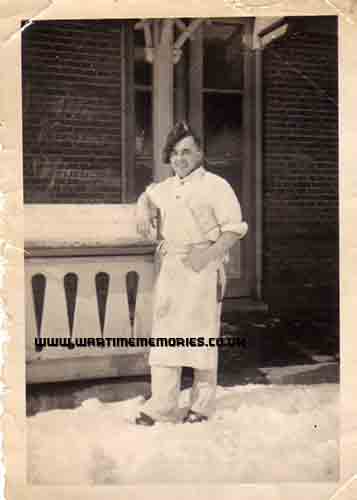Wally Mackenzie knew that France had been invaded through Normandy, but he was in a field in the south of England, waiting to be called and as this was the Army he just continued to wait. He arrived in France around 54 days after the 6th June invasion.
Eventually, in the rain, he scrambled over 3 ships to get to his channel transport. The hatch was screwed down tight...... that was when he knew fear. He doesn’t do dark closed in spaces, even now. He spotted a tank in the next enclosure so he knew he was on a TLC (Tank Landing Craft).
On landing on the French shore (somewhere on Gold Beach) the lowered ramp enabled him to get onto the beach, without getting his feet wet, as Frank, his mate, held his rifle for him as he jumped off the ramp. The rifle was 6’’ taller than Wally. Wally does humour, this is the way he tells it. It was raining still, as in England, and they marched forever and slept under a hedge with Frank, one ground sheet beneath and one on top.
The following day more marching and arrived at a large field, surrounded by barbed wire with a large group of other soldiers with 1 large water truck in the middle. For 2 weeks, lots of fatigues, did no cooking. I cannot find out what they ate - only that they had 2 X 24 hour packs that were not to be opened
Meantime lots of shelling over the top of them from our artillery and naval guns. At the end of 2 weeks he moved to the outskirts of Bayeux with 8 other cooks to support Royal Engineers in 30 Corps while they waited to move forward. By this time he was cooking and drawing rations for 30 men and officers.
It must be mentioned that most of the 2nd World War operated on 1918 Argentinean Corned beef and it was weeks and weeks before they saw a bread baking unit, as they had no flour to bake with. He learned to be resourceful, trade, acquire, steal, be creative and always have a burly Sergeant behind you as you served (and look after the sergeants specially).
The War moved forward and he was on the outskirts of Caen, feeding, cooking what came to hand, collecting rations. Wally made friends with the French people where ever he stopped and helped them where he could, many were children, helping probably more than he should. Caen was Paul and Yvette, who were writing to him up to 2005, though I believe the family has passed away now.
On to the outskirts of St Lo., where he cooked and did his job and helped more French people/children who were close to his cook house, he was adopted as a 4th son, though the family names have faded with time from Wally’s memory. How do you make tea for 100 men, 20 minutes to do so. Boil water, plenty of tea, but no sugar, solution pour 3 lbs of raspberry jam into large tea container. No one complained. No milk, the cows were dead
This is his time in France, at no time was he told where he was or going and when speaking French he did so with a Normandy accent, so other French people have said. He shakes his head and says he did not know how he did it, feeding the men, but he was 20 then and resourceful.
Then onto Holland, Breda, more Dutch friends and adoption. He left his appendix in Brussels and speaks fondly of an injured German soldier who helped him in the hospital. He spent time in Hamburg (it snowed) and cooked surrounded by Gerry cans of petrol as he and others cooked for a Tank repair and service group. By now he was a fully mobile in a 1.5 ton truck which moved him and cooking equipment around. The .303 rifle was long gone and was replaced by a Stengun which was a better size.
Berlin in 1945 and he managed an escorted trip (with a Sergeant in charge) to where Hitler died. The Russians were armed; the Brits had to leave their guns in the British Quarter. ”Like a scruffy rubbish tip “ was Wally’s comments on the bunker area. In 1946 he was demobbed. Everyone one likes Wally, they still do now. No mention of guns and war but this was Wally’s WWII.





